- Home
- Oliver Sacks
Oliver Sacks Page 2
Oliver Sacks Read online
Page 2
SACKS: Thank you.
AN ANTHROPOLOGIST ON MARS
INTERVIEW WITH CHARLIE ROSE
CHARLIE ROSE
FEBRUARY 1995
ROSE: Oliver Sacks is here. His new book is An Anthropologist on Mars. He is professor of clinical neurology at Albert Einstein College of Medicine, author of Migraine, Awakenings, The Man Who Mistook His Wife for a Hat, and Seeing Voices: A Journey into the World of the Deaf, and it’s a pleasure to have him back on this broadcast. Welcome.
SACKS: Thank you.
ROSE: Tell me what it is that you think that you do, because you say, in an interesting way, that what your work is about is an intersection of biology and biography. Meaning what?
SACKS: Well, I want to describe lives which have been influenced by some overwhelming neurological problem or deficit, like colorblindness or autism, but to expand it into a full biography, which involves my spending time with a person and seeing them in real life, in their homes.
ROSE: You came from a family of doctors, yes?
SACKS: Yes.
ROSE: Your brothers are doctors?
SACKS: Yes.
ROSE: Your mother and father were involved in medicine, yes?
SACKS: Right, mm-hm.
ROSE: When did you develop the interest that you have in neurology and the neurosciences?
SACKS: Well, I think in a way it was very, very early, and both my parents trained in neurology although they didn’t practice it.
ROSE: Yeah.
SACKS: But the … the brain is the most incredible thing in the universe, and I think I probably knew from twelve or fourteen that was it.
ROSE: Was there a moment? Was there an event? Was there a thing that … I mean, was there a time that it happened for you? No epiphany?
SACKS: Well, there have been a lot of epiphanies, but, no, it emerged. Right.
ROSE: Yeah. Talk about some of the people here, of these people. I mean, I … the characters from Temple Grandin to Dr. Carl Bennett and Virgil and, and the others that you profile here. Who is closest to you? Who is the one whose story you find the most fascinating?
SACKS: I think probably the … well, I find them all fascinating.
ROSE: I know you do.
SACKS: But I think probably the first case, the case of the colorblind painter—
ROSE: Yeah.
SACKS: —this fine artist who wrote me out of the blue, although he could no longer see blue at that time—
ROSE: Yeah.
SACKS: —saying that he’d had a head injury, and he’d suddenly lost all of his color perception. And for him, as a color artist, this absolutely drained the meaning and feeling out of the world, and he was sort of desperate. I’d never really thought about color and what this might mean. And first of all, I determined what, you know, what exactly had gone wrong, that really the color parts of the brain had been knocked out.
ROSE: Yeah.
SACKS: But what seemed to me so fascinating was that this horrible, impoverished gray world he was in gradually changed for him and became beautiful and full of meaning again, and he started painting again and sort of re-centered himself as an artist in black and white, and at that point, when we wondered whether he might want color, he said, “No. My world’s complete without it.” But I knew him very well, and we really became companions and friends, and he seems to me the most beautiful example of an adaptation, really, of having lost one’s health and one’s normality—color vision—he, he got another health.
ROSE: If you look at all the people in here, do they share any common denominator, in a sense—if you lose a sense, or if you lose something, what?
SACKS: Something else will develop and will heighten, and I think this sort of adaptational compensation probably runs through all, all seven.
ROSE: Well, take Temple Grandin for me. She gave the title to the book, yes?
SACKS: Right.
ROSE: She called herself, she felt … well, you describe it for me. Because I thought you might say she was the most interesting to you.
SACKS: Well, I … I—
ROSE: I’m not asking you to choose among your children, but—
SACKS: —no, no. I was never intending to write about her. I met her, and I was sort of swept off my feet during the weekend, and I largely wrote the piece on the journey back from Colorado.
ROSE: Why did she sweep you off her feet? Off your feet?
SACKS: Well, here’s a woman who was deeply autistic at three, and sort of rocking and mute and inaccessible, and now she is this, this extraordinary sort of world expert on cattle, and highly intelligent, and yet, in a way, completely missing in the sort of social dimension. She doesn’t understand people’s expressions or states of mind.
ROSE: And doesn’t want any human contact, does she?
SACKS: Well, I … no, I think she does. She’s not really withdrawn, but she does say, she says she’s studying us. She’s studying the species—
ROSE: Yes.
SACKS: —you know, very, very closely, and then she said she felt like an anthropologist on Mars. But really, the sense of someone who, in a way, is an outsider and forced to be an outsider, but who by an immense sort of intelligence really, really is bridging the gap: she is so different and so human, and I had never met anyone like her.
ROSE: Tell me about Virgil.
SACKS: I had a phone call telling me of Virgil. He’d been blind more or less from birth—
ROSE: Right.
SACKS: —and he was given the gift of sight when middle-aged, when he was fifty, but it didn’t work. People expected either that the operation would fail or that he would emerge fully sighted, and what happened was neither. The telephone conversation said he sees everything, but he recognizes nothing. When the bandages came off, he just saw a blur of movement and color, and then there was a voice, and he knew voices came from faces, and this blur, this chaos, must be a face, but he couldn’t form a perception of a face. His brain had never learned to, to deal with things … and so he was really thrown into a state of profound confusion, into a visual world which made no sense, somewhat like the visual world of “The Man Who Mistook His Wife for a Hat”—
ROSE: Yes.
SACKS: —but there, those parts of the brain had been destroyed. In Virgil, they’d, they’d never developed. Now, he was a brave man, and he, he sort of adventured into this, this alien chaotic world of sight, although it was full of dangers for him, and he … There have been very, very few cases like this, and in every case, there’s a tremendous crisis because someone has been secure in the senses they have, and you can’t force a new sense on anybody. I mean, it would be like forcing you suddenly … giving you X-ray vision.
ROSE: That would be good. What, what, what sense that you don’t have, I mean, you have all the obvious senses, what power would you most like to have that you don’t have, what ability would you most like to have you don’t have? What skill, what insight?
SACKS: I … I’d like to be a mathematician sometimes. I’m not very good at maths.
ROSE: Why a mathematician?
SACKS: Because I feel this is a different way of articulating the universe, and at least the equivalent of language. And I think probably many people would be decent mathematicians if they were decently educated, but I think, I think now, with the new maths, people, people are.
ROSE: How would you measure your skill in being able to reach people—to the patients—in contrast to your skill as, as … your professional skill, your medical training? I mean, it, it seems to me that’s what separates you, that’s what gives you the gift.
SACKS: I was going to say that I would like more, more empathy, and then some—
ROSE: Yeah.
SACKS: —somehow mathematics sort of darted in.
ROSE: Yeah. But it would seem to me you are full of empathy. Are you not? I mean, are you less empathetic than we might imagine? Is this more scientific than we assume from your presence?
SACKS: No. I think that sc
ience can’t simulate empathy, which is partly what, you know, what goes on with Temple. But I … it’s a tremendous privilege, extraordinary, when people, in a way, let one, you know, they let you into themselves.
ROSE: You feel privileged that they will allow you to come inside of their own soul and emotion and being and, and share.
SACKS: Absolutely. And it’s a very delicate business, but it’s—and one mustn’t be invasive or push—but it is like being invited into a sanctuary.
ROSE: Well, some thought you were invasive, thank you very much. In fact, it was Miriam—what was her name?—who, who didn’t like the fact that you wrote about her, right?
SACKS: Oh, well, right. That was in Awakenings.
ROSE: Yes.
SACKS: Well, it wasn’t that—
ROSE: And she found a copy of the book from England or something?
SACKS: Yes, yes.
ROSE: Wasn’t it—
SACKS: Yeah, she— I tried to conceal Awakenings from—
ROSE: Yeah, right, right.
SACKS: —the patients, but she—
ROSE: And she didn’t like the—I’m interrupting, but she—tell me why she was upset.
SACKS: Well, no. She didn’t mind me telling, as it were, the tragedy of her life, but she didn’t like the physical description. And—
ROSE: Can you understand that?
SACKS: I understand that very well, especially after I was profiled myself in The New York Times, and they said I was monstrously fat.
ROSE: Oh, my God! Did they?
SACKS: And it so annoyed—
ROSE: The big, bad New York Times.
SACKS: Right. It so annoyed me, I lost one hundred pounds.
ROSE: Did you keep it off?
SACKS: Yeah.
ROSE: Oh, good for you! The, the notion of the … Awakenings and, what do you think of Robin Williams? You’ve got to know him well. And you’re going later this evening, you’re going to be honored—he’s being honored by some—
SACKS: Right.
ROSE: —academy here in New York. You two are friends?
SACKS: Yes, indeed.
ROSE: Yeah. Tell me about the friendship because he played you, obviously.
SACKS: Right. Well, we, we spent a lot of time together at first, and we hung out together. We went to see patients, and I thought he was just, you know, a nice, brilliant guy. I didn’t realize that I was, in fact, the subject of unceasing, relentless, and at the same time very, very sympathetic observation—
ROSE: Yeah, right.
SACKS: —until I was having a conversation with him, and I got into one of my odd gestures such as you see there—
ROSE: Yeah, like this. Yes.
SACKS: Yes … that I seem, I seem to get into these things.
ROSE: And all of a sudden, he’s watching.
SACKS: Yeah. Well, well, well, no. He was in the, in the same gesture, and he wasn’t imitating me, but by that point, he had—
ROSE: He was becoming you.
SACKS: Well, exactly. He, he had my gestures. He had my opinions, my wishes, my regrets, my interests, my memories.
ROSE: Yeah, yeah.
SACKS: I mean, it was an extraordinary sort of identical, instant identical twin. At that point, we felt we had to make some distance between us.
ROSE: You felt or he felt, or both?
SACKS: I think … well, I certainly felt it. I think he felt it a bit as well.
ROSE: That he’d better pull back. He was becoming you, rather than—
SACKS: Yeah.
ROSE: —giving himself some room to create.
SACKS: Absolutely. But since then we’ve seen quite a lot of each other, and we, we enjoy our differentness, as well as the sort of strange convergence which once happened.
ROSE: And your differentness is simply what you do or, or something more—
SACKS: The … perhaps there’s also something similar. I think, I think we’re both sort of a bit, a bit explosive, but we’re sort of complementary creatures.
ROSE: You consider Martin Buber one of your favorite writers, yes?
SACKS: Right, right.
ROSE: And, and you’ve taken what he says and sort of paraphrased it and translated it into, “We must humanize technology before it dehumanizes us.” What’s the worst fear? How does that fear manifest itself, in your judgment?
SACKS: Well, in medicine, I think the person can be replaced by the CAT scan and the EEG, which reduces the person to an object, and it reduces the physician to a technician, and I think, I think this is a great ever-present danger in medicine. But it sort of infuriates me, in a way, to have to humor my computer because—
ROSE: Yes.
SACKS: —because it’s, you know, it’s not like talking to someone, and—
ROSE: Yeah.
SACKS: —although perhaps computers are getting a bit—
ROSE: You have to humor it in order to—
SACKS: To use it. I mean, it forces me to do things its way.
ROSE: Otherwise, it’ll cut out on you.
SACKS: Right.
ROSE: You’re next going to do—you’re going to go to the island of, of Pingelap.
SACKS: Well, I, I went to this little island, and I—
ROSE: This is for another book, is it?
SACKS: Yes, I think so.
ROSE: Yeah.
SACKS: This is a, a little coral atoll on the Pacific, where congenital colorblindness—being born totally colorblind, which is tremendously rare, one in 50,000 in the normal population—is common.
ROSE: So most of the people there are colorblind.
SACKS: Well, well, certainly, there, there are seventy or eighty colorblind people, and there’s a, so to speak, a community who have had no concept of color for two centuries—
ROSE: Yeah.
SACKS: —and whose language and whose dress and whose horticulture—and they have, they get along fine. And I think partly they think the rest of us are suffering from sort of chromatic hallucinations.
ROSE: Well, I mean, maybe this is the reason some people like black-and-white film or something. But what, what is it that fascinates you about them? I mean, why, of all the things that you could be curious about, are you curious about them?
SACKS: I’m, I’m damned if I know, but there you are.
ROSE: But, well then, my second question is all of a sudden you went there. Didn’t you do something to your—what did you do?
SACKS: Well, it’s possible now, using a bit of technology—
ROSE: Yeah.
SACKS: —to, to buzz that part of the brain, which—
ROSE: You can … how would you do it? How would you buzz that part?
SACKS: Well, it’s done with a magnetic device. It’s done through the skull. It is harmless.
ROSE: Is it done one time, or done every day, or what?
SACKS: No. It, it’s just done one time.
ROSE: And then, so you can—then your color perception is gone until you’re buzzed again.
SACKS: Yes, perhaps for ten or twenty minutes.
ROSE: Oh.
SACKS: I want to know what Jonathan I. felt and saw. I want to know what all of my patients experience. I … it’s not sufficient for me just to hear it and look at it. I want to sort of really dive in and experience it myself if I can. I think with this, this achromotopia, this knocking out the color areas, this one can—
ROSE: Yeah. What’s … what areas of exploration of the brain are the most fascinating to you?
SACKS: I think increasingly those to do with consciousness. I, I’ve looked at sort of perception and movement for years, but now I’m interested in language and consciousness and what—
ROSE: Consciousness.
SACKS: —and what makes us a person, the neural basis of being Charlie Rose or Oliver Sacks, because you—your brain is you in a way in which your heart isn’t. You could have a heart transplant. You couldn’t have a brain transplant.
ROSE: I might need on
e, though. But go ahead.
SACKS: And, and the way in which the brain embodies the self and has been doing so from the moment of birth, and I think, I think this is the exciting thing. And, and—
ROSE: Is it—do you have a sense—am I right in assuming that we, you know, that we are just beginning to understand the brain? I mean, if you look at our analysis of how the human body works and all, we—the area that’s least explored is the brain, and that has the most potential for payoff?
SACKS: Oh, oh, absolutely. I mean, I think we understand the heart or the liver or the kidney very well now. There are many further things to be learned, but with the brain, we’re only starting. We have really no idea. I mean, the complexity is—you know, there are, there are sort of thousands of messages going on simultaneously between different parts of the brain. It is unimaginably complex and beautiful, and I think one hundred years from now, you know, people will still be in mid-investigation.
ROSE: Why do you like to swim so much?
SACKS: Because … because I’m a water creature. I’m at home in the water. I lose my self-consciousness. I feel like a porpoise. When—my father was a swimming champ. He threw us all in when we were babies, and so I have always swum.

 Uncle Tungsten
Uncle Tungsten Oaxaca Journal
Oaxaca Journal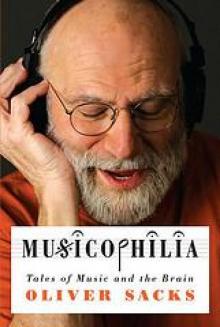 Musicophilia
Musicophilia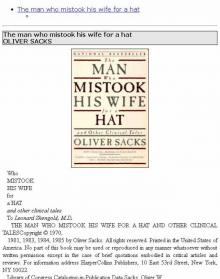 The man who mistook his wife for a hat
The man who mistook his wife for a hat 1989 - Seeing Voices
1989 - Seeing Voices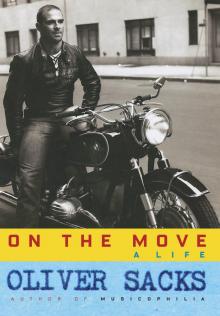 On the Move: A Life
On the Move: A Life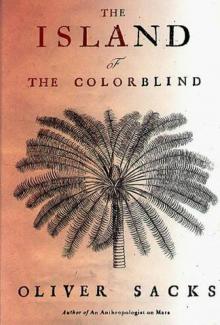 1996 - The Island of the Colorblind
1996 - The Island of the Colorblind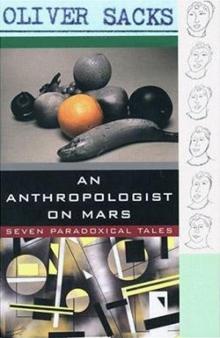 An Anthropologist on Mars: Seven Paradoxical Tales
An Anthropologist on Mars: Seven Paradoxical Tales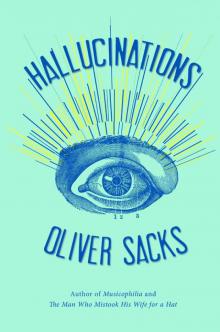 Hallucinations
Hallucinations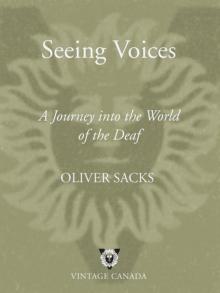 Seeing Voices
Seeing Voices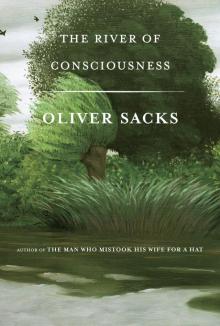 The River of Consciousness
The River of Consciousness Vintage Sacks
Vintage Sacks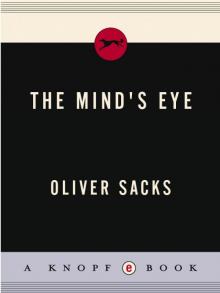 The Mind's Eye
The Mind's Eye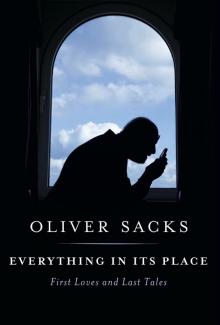 Everything in Its Place
Everything in Its Place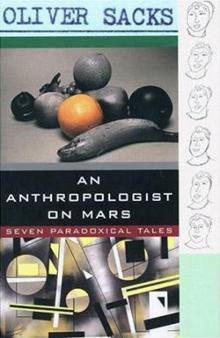 An Anthropologist on Mars (1995)
An Anthropologist on Mars (1995) Uncle Tungsten: Memories of a Chemical Boyhood (2001)
Uncle Tungsten: Memories of a Chemical Boyhood (2001)